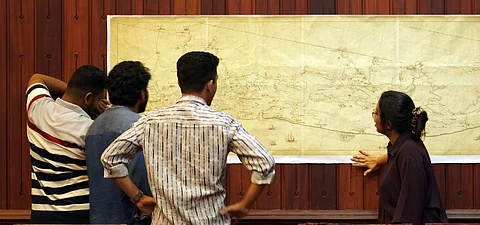

Follow TNM’s WhatsApp channel for news updates and story links.
Researchers from India and the Netherlands began a four-day intensive programme in Kochi on August 11 to unlock centuries-old Dutch records that could provide fresh insights into Kerala's colonial history.
The Cosmos Malabaricus Summer School, jointly organised by the Kerala Council for Historical Research (KCHR) and Leiden University, has brought together scholars to Fort Kochi to learn how to decode 17th and 18th-century Dutch archival materials. This year's Summer School has ’Exploring the Dutch Colonial Archive on Early Modern Malabar’ as the theme.
The programme stems from a discovery made decades ago by professor Michael Tharakan during his student years in the Netherlands. Tharakan, former KCHR chairman, found extensive Dutch records in the National Archives of the Netherlands that had remained largely unexplored by Indian historians.
One of the most compelling aspects of the Cosmos project is its dedication to ‘archive hunting’ — the active search for lost or overlooked documents in Indian and Dutch repositories. This process has enabled KCHR researchers to access, catalogue, and begin translating a vast corpus of Dutch records, many written in Paleographic Dutch, revealing new data on Kerala’s past.
Paleographic Dutch is an archaic script that few contemporary scholars can read. The summer school is training participants to translate these documents, which could open new perspectives on Kerala's past.
These documents explore beyond trade and warfare, illuminating themes such as enslavement systems, land tenure, taxation, caste hierarchies, religious interactions, and the everyday experiences of people living in Dutch Malabar — narratives long overshadowed by Portuguese and British colonial histories.
Four early-career researchers, dubbed ‘Cosmos Fellows’, have recently completed training and will share their experiences with participants. The fellows spent months at the National Archives of the Netherlands and Leiden University learning transcription techniques and archival methods.
International participants include professor Jos Gommans and Dr Mahmood Kooria, while Indian scholars such as professor Lekshmi Subramanyam, KN Ganesh, and Pius Malekandathil will provide regional contexts.
The project also involves community engagement, with sessions featuring Dutch descendant Harry Gunther, documentary director Rajesh James, and local storyteller Bonny Thomas alongside heritage professionals and former MP Charles Dias.
The summer school will conclude on August 14 with a guided field trip — a boat journey through the historical waterways of Kochi and surrounding regions to understand how colonial cartography shaped governance, trade and settlement patterns. Participants will follow a ‘cartographic fieldwork’ route by boat and land, tracing Dutch-era maps through areas including Vypin, Bolgatty, Mulavukad, and Varappuzha.